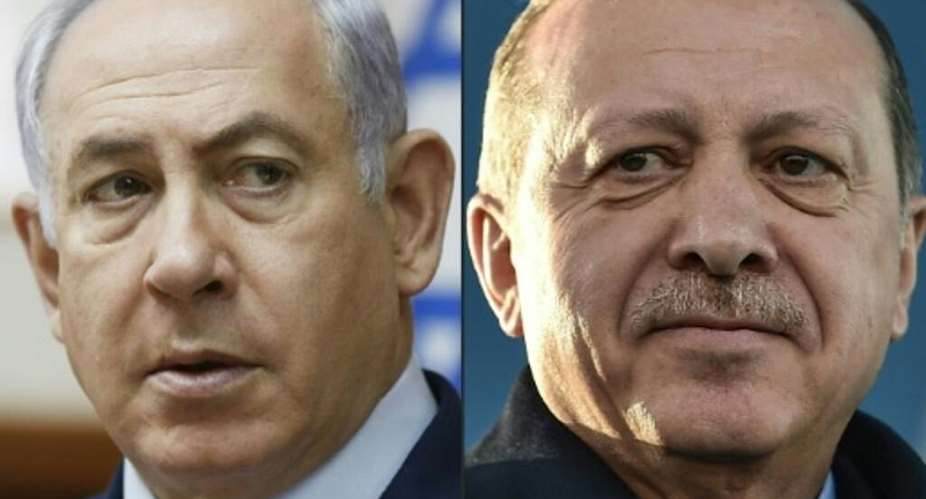Israeli Prime Minister Benjamin Netanyahu is set to visit Turkey in October or November, according to Turkish President Recep Tayyip Erdogan. This as rapprochement efforts accelerate.
The announcement follows a groundbreaking meeting between the leaders who, until recently, had made little secret of their dislike for one another.
Speaking to reporters while flying back from New York, Erdogan said Netanyahu would visit Turkey in October or November and that he would make a reciprocal visit.
Erdogan, a devout Muslim, has reportedly expressed his wish to visit Jerusalem this year and pray at the al-Aqsa Mosque, Islam's third holiest site.
The diplomatic breakthrough came on the sidelines of September's United Nations General Assembly, where Erdogan and Netanyahu met face-to-face for the first time.
The meeting is viewed as a milestone in recent rapprochement efforts in a long and often rocky relationship with both men often trading angry insults. Despite the past hostility, observers suggest the two leaders are not dissimilar.
"There are so many similarities between the two ... both have charisma and both are doers," said Mehmet Ogutcu of the London Energy Club.
"Both leaders have said quite nasty things about each other in the past, but when there are nations, interests override. They forget about the past, and they can move into a new relationship.
"I think we will see Netanyahu and Erdogan building on what has been achieved over the past two or three years."
Turkish-Israeli rapprochement
Turkish-Israeli rapprochement efforts were initiated before Netanyahu returned to power, with Israel President Isaac Herzog visiting Turkey last year.
Despite fears Netanyahu would end reconciliation efforts, both sides described the New York meeting as positive.
In a post on X, Turkish officials said the talks focused on energy cooperation. Ankara is courting Israel as the cheapest route to distribute natural gas from its vast reserves via a pipeline through Turkey to Europe.
"Rapprochement has been on a positive trajectory for quite a while," said Selin Nasi, at the London School of Economics' contemporary Turkish studies department, adding there were several areas where cooperation can be deepened.
"Energy security is one of them, especially with the Russian invasion of Ukraine. Energy security has become one of the major topics, and exploitation of the gas reserves in the Mediterranean, Eastern Mediterranean is a hot topic for Turkey."
However, veteran regional observers voice caution over Ankara's hopes of quickly securing Israel's backing for a pipeline to distribute Israeli gas via Turkey to Europe.
"The biggest trouble is that there's no mutual trust between Israel and Turkey, because if you build a pipeline it will stay for at least 50 years, "warns Ogutucu.
"And so, what happens if Erdogan, or whoever comes later on, decides to turn off the tap one day?"
Common interests
Confidence-building measures are focusing on collaborating on common interests. Iran's growing influence in the region is an area of shared concern.
Azerbaijan, supported by both Israel and Turkey, is where concerns over Tehran really coincide, as Iran backs Azerbaijan's rival, Armenia.
The Azeri military's defeat of Armenian-backed forces over the disputed Nagorno-Karabakh enclave underlined the importance of the cooperation. That is the view of Gallia Lindenstrauss, an Israeli foreign policy specialist at the Institute for National Security Studies in Tel Aviv.
"For Israel, Iran is an existential threat. For Turkey it's just a nuisance or something that you should deal with," she said.
"The only exception is Azerbaijan, where the tensions between Baku and Tehran have grown substantially in the past two years. And here Israel is a strong supporter of Azerbaijan, and Turkey is a strong supporter in Azerbaijan."
With Erdogan, a strong backer of the Palestinians, the ongoing cycle of violence between Israel and the Palestinians remains a threat to Turkish-Israeli rapprochement.
However, after years of Turkish-Israeli relations remaining in the deep freeze, Nasi of the London School of Economics says Ankara realises engagement with Israel may offer a better chance of promoting the Palestinian cause.
"In the times that Turkey and Israel had distanced relations, Turkey lost its power to influence what was going on between Palestinians and Israelis," he said.
"Now that they are closer with the Israelis, Turkey has a better chance to influence what is going on the ground."





 Paramount Chief of Gwollu dead
Paramount Chief of Gwollu dead
 TUC tells informal sector employers to pay their employees the minimum wage
TUC tells informal sector employers to pay their employees the minimum wage
 Prof. Marfo urges good civilian-security relations to promote peace
Prof. Marfo urges good civilian-security relations to promote peace
 I was nearly jailed because of NPP; I’m still ‘pained’ — Hopeson Adorye
I was nearly jailed because of NPP; I’m still ‘pained’ — Hopeson Adorye
 Rising against NPP after being a minister for 15 years is a sin; God will judge ...
Rising against NPP after being a minister for 15 years is a sin; God will judge ...
 Cecilia Dapaah: Reasons behind AG’s advice to EOCO not grounded in law – Martin ...
Cecilia Dapaah: Reasons behind AG’s advice to EOCO not grounded in law – Martin ...
 NPP should have reported Kingsley Nyarko’s conduct to police – Inusah Fuseini
NPP should have reported Kingsley Nyarko’s conduct to police – Inusah Fuseini
 Akufo-Addo cuts sod for MIIF Technical Training Centre
Akufo-Addo cuts sod for MIIF Technical Training Centre
 NPP didn’t struggle to win Ejisu by-election – Samuel Ayeh-Paye
NPP didn’t struggle to win Ejisu by-election – Samuel Ayeh-Paye
 Naa Ayemoede returns to school
Naa Ayemoede returns to school
